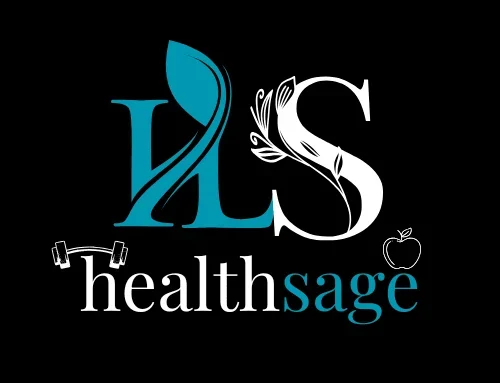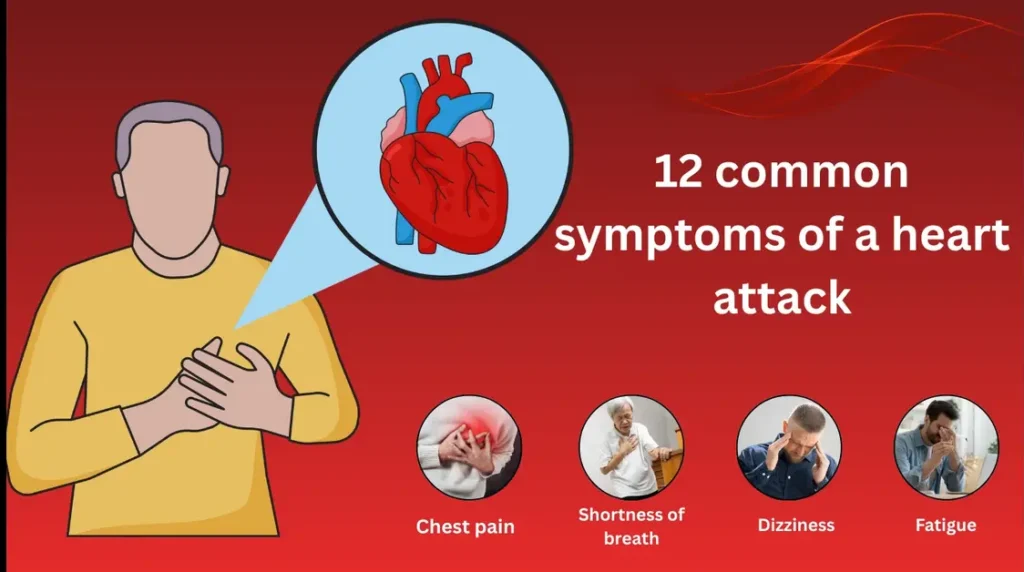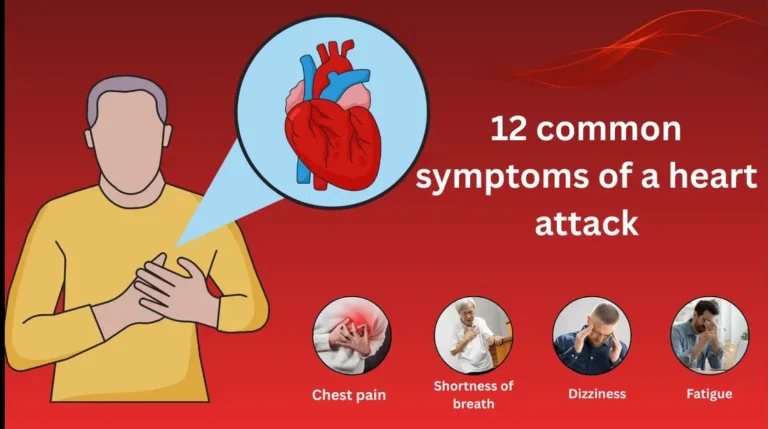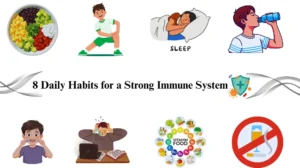Nowadays, heart attack has become a well-known and deadly disease. Every day, many people around the world are suffering from heart attacks and dying, so it is important to be careful about it. Below, we have discussed 12 common symptoms of a heart attack. If you experience these symptoms, consult a doctor promptly.
However, before understanding the symptoms, it is helpful to have some knowledge about a heart attack.
Table of Contents
ToggleUnderstanding Heart Attacks
Heart attacks are mainly caused by blockage of blood flow in the arteries of the heart.
This blockage can be due to various reasons, such as excess cholesterol or fat accumulation. When these substances slowly accumulate, they can form plaque in the arteries, which can block the blood supply to the heart, potentially leading to a heart attack.
12 Common Symptoms of a Heart Attack
Here are some common symptoms of a heart attack:
1) Severe chest pain
One of the main symptoms of a heart attack is severe chest pain. This pain can sometimes be felt on the left side or in the middle of the chest.
In this case, along with the severe pain, there may be a feeling of pressure and heaviness in the chest, and this pain and discomfort may last for a few minutes or may come and go.
2) Breathing difficulty
Shortness of breath is one of the symptoms of a heart attack.
This is mainly due to the heart not being able to pump properly, which can cause blood clots to form in your lungs and obstruct the oxygen supply to the heart, which causes problems like shortness of breath.
3) Fatigue
There are multiple causes of fatigue, such as overwork, diabetes, and thyroid issues.
In case fatigue is serious and it is accompanied by shortness of breath, it may be one of the signs of a heart attack.
4) Sweating
When there is excessive sweating for no reason, especially cold sweat, it may be due to heart problems.
5) Pain all over the body
Heart pain is not limited to the chest. It can spread throughout the body, especially to the upper back, arms, or jaw.
6) Heart palpitation
Symptoms of a heart attack include heart palpitations. If you experience heart palpitations along with shortness of breath, it is essential to seek medical advice immediately.
Although a variety of reasons can cause palpitations, they can also mean an irregular heartbeat that may precede or accompany a heart attack.
7) Nausea
Nausea is not only caused by a poor diet or digestive problems. Various studies have shown that nausea can also be a symptom of a heart attack.
8) Swelling in the legs
Any type of heart disease can cause swollen feet.
If your feet swell, it could be a symptom of heart disease or a heart attack. This swelling occurs when the heart stops pumping properly and fluid begins to accumulate in the body.
9) Stomach pain
Stomach pain does not necessarily mean that a heart attack is imminent, but it is considered a possibility of a heart attack. According to many doctors, stomach pain is mainly considered to be a problem caused by indigestion, but apart from that, stomach pain can also be caused by kidney and heart problems, so it is important to find out the exact cause first. In this case, it is necessary to consult a good doctor.
10) Sleep disturbance
In many cases, sleep disturbances are considered symptoms of a heart attack, such as frequent awakenings at night, not getting enough sleep, or restlessness. If these symptoms persist for a long time, you should be alert.
11) Loss of appetite
Loss of appetite and reluctance to eat can be one of the early signs of a heart attack.
It is important to remember that loss of appetite is not only a symptom of a heart attack. Loss of appetite or reluctance to eat can be caused by various reasons such as flatulence, digestive discomfort, and depression etc.
12) Dizziness
If you feel weak, dizzy, or lightheaded, it could be a possible sign that your blood pressure has dropped or that there is a lack of sufficient oxygen-rich blood in your brain. This is even more worrying when it is accompanied by chest pain, discomfort, or cold sweat.
How to Differentiate Between Heart Attack Symptoms and Other Conditions
The above symptoms are not only seen before and after a heart attack; these symptoms can also be seen in other diseases, so it is necessary to make a correct diagnosis. Some of the symptoms seen in heart attacks and other diseases are given below.
1) Chest pain
In other diseases
In addition to heart disease, severe chest pain can also be caused by indigestion. Many people worry about which chest pain is related to digestion and which is associated with a heart attack, and avoid the issue. If the chest pain is due to a digestive problem, it can be easily cured by taking digestive medicines.
In case of a heart attack
In this case, the chest pain is permanent and does not improve with digestive medicines. Along with this, severe shortness of breath is seen. This pain is not limited to the chest. It can spread to the back, abdomen, chest, and arms.
2) Fatigue and shortness of breath
Fatigue and shortness of breath can also be seen in cases of heart attack and other diseases.
In other diseases
Fatigue and shortness of breath can be due to anemia, asthma, or allergies. In this case, shortness of breath and fatigue may be accompanied by cough and fever. Chest tightness may be due to anemia or asthma, but there is no severe pain in the chest.
In case of a heart attack
When the lungs cannot pump blood properly and a clot forms in a heart artery and blocks the blood flow, fatigue and severe shortness of breath are seen. In this case, there is no cough, but there may be severe chest pain and pain in different parts of the body.
So, consult a doctor for proper treatment and get the correct diagnosis through various tests.
How to Prevent Heart Attacks
There are various ways to reduce the risk of a heart attack.
1) Eat healthy food
To keep your heart healthy and reduce the risk of a heart attack, you should follow a healthy diet. Avoid red meat, fast food, outside food, and overly fried and oily foods.
2) Reduce stress
Excessive stress can also harm heart health, so it is necessary to control it.
3) Exercise daily
Walking and exercising every day is good for mental and physical health and helps reduce the risk of a heart attack. You should exercise for at least half an hour every day.
4) Get enough sleep
Lack of sleep increases the risk of heart health as well as mental health and other diseases, so it is important to sleep at least 7 hours a day.
5) Seek medical advice
If you have symptoms of any disease, you should consult a doctor without delay and get the correct diagnosis and treatment.
Conclusion
In conclusion, it is essential to recognize the symptoms and risk factors of a heart attack, allowing for timely action to be taken and saving lives. By identifying symptoms such as chest pain, shortness of breath, and other symptoms, including mental, a person can immediately contact a doctor.
Prevention and early detection of heart attacks depend on awareness. A healthy lifestyle, a healthy diet, controlling risk factors, and knowing the symptoms of cardiac events can greatly reduce a person’s chances of having a heart attack.
Frequently Ask Questions
1) What are the most common symptoms of a heart attack?
Ans- Chest pain and shortness of breath are the most common and well-known symptoms of a heart attack.
It can feel like pressure, tightness, fullness, or a sharp pain in the center and left side of your chest. It can last for more than a few minutes, subside, and then come back.
2) Could feeling suddenly weak or tired be a sign of a heart attack?
Ans- Yes, if you suddenly experience extreme weakness and fatigue without any physical exertion, it can be a sign of heart problems and a heart attack.







